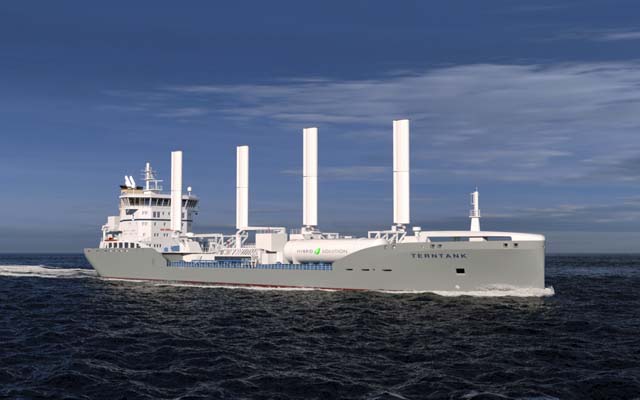Kongsberg Maritime has secured a contract to design and a equip a 10th hybrid chemical tanker for Danish operator Tärntank.
The new Tärntank vessels will reduce CO2 emissions using a combination of clean technologies. The wind-assist technology will be installed on the latest four vessels ordered, and this feature alone is expected to reduce emissions by up to 19%. The new vessels will have an EEDI close to 40% below the 2025 Phase 3 requirements.
The 15,000dwt hybrid tankers can operate on diesel, biofuel or methanol, and feature wind-assist technology plus Tärntank’s own battery-powered Hybrid Solution. This latest order follows previous contracts for the Kongsberg Maritime design. All feature a range of Kongsberg Maritime technologies to save energy and reduce emissions.
The vessels will employ the Promas propulsion system, with flap rudder, delivering fuel consumption savings of more than 6% compared to alternative systems. The equipment package also comprises a tunnel thruster with M-con thruster control system, K-Chief integrated automation systems, AutoChief propulsion control system and deck machinery. The vessels will have an efficient hull design – the NVC 615 CT – characterised by Ice Class 1A efficiency, and a wave-piercing bow.
Claes Möller, Tärntank CEO, said: “This combination of a good design and innovative systems installed to a newbuild vessel will reduce the carbon footprint of maritime operations beyond the regulatory requirements. This is a result of good cooperation between Kongsberg Maritime, China Merchants Jinling Shipyard (Yangzhou) and Tärntank. Tärntank’s customers Neot/ST1, Neste, Esso/Exxon and Preem, which all have a target to reduce their carbon footprint of the supply chain, play an important role in making this possible”.
Rune Ekornesvåg, Kongsberg Maritime Sales Director, Ship Design, said: “This innovative tanker design embraces the fuel transition and fits perfectly with Tärntank’s desire to adopt sustainable technologies. Ordering 10 vessels, which will all have an Energy Efficiency Design Index above 40% below the 2025 Phase 3 requirements, is a clear, forward-looking commitment from Tärntank and shows they are a progressive ship owner that’s serious about operating a fleet of vessels that use the latest technologies to drive down fuel costs and emissions.”
This latest order brings the total ships ordered in this design series to 12, following a contract for two very similar vessels, without suction sails, for Swedish operator Sirius Redri. All 12 vessels will be built at China Merchants Jinling Shipyard, Yangzhou and the first vessel with wind-assist technology will be delivered in 2025.
Image: Kongsberg tanker design for Tärntank (credit: Kongsberg Maritime)



